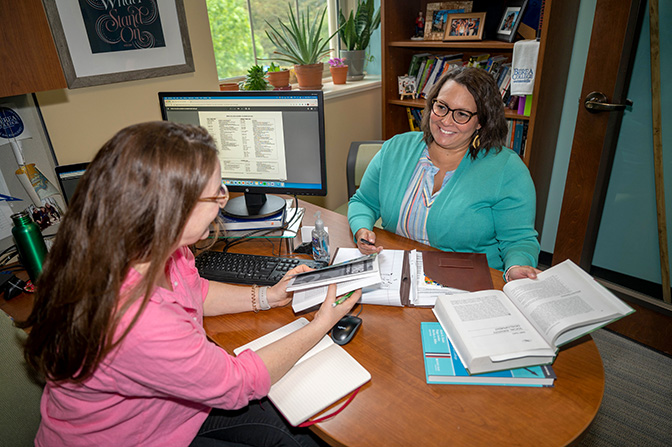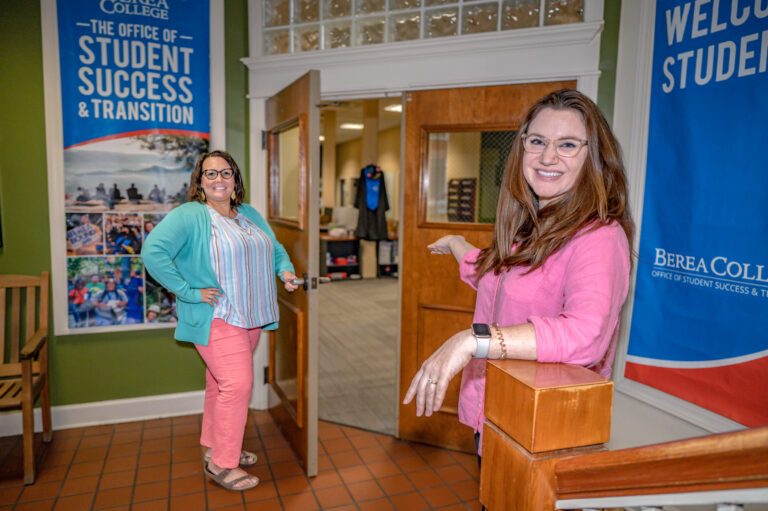A student’s walk across the stage at commencement is momentous, but it is not a moment that stands alone in time. Each step across the stage is a culmination of support that began when that student stepped onto Berea’s campus. For most, that first step is exciting and full of anticipation, but for others, it is fraught with challenges, fears and near failures.
Maybe it’s realizing the stark contrast between high school and college expectations. Maybe it’s anxiety about responsibilities left unattended back home. Maybe it’s being overwhelmed by everything new in a place that despite its best efforts doesn’t feel at all like home. Berea supports students to help them thrive and succeed from day one—but when success begins to shrivel, Berea’s support kicks into high gear.
The Office of Student Success and Transition (SST) is charged with providing students with the guidance and development needed to successfully transition into, navigate through and graduate from Berea College. Student Success coordinators Shalamar Stokely Sandifer ’03 and Rosanna Hutcheson ’13 lead Berea’s intervention team. Only three weeks into the fall term, they create progress reports, which allow faculty members to identify students who seem to be struggling academically or are missing class. These faculty concerns are then investigated by the SST team.
“We meet as a team, and we review every single note,” Sandifer said, “and then we decide who will intervene, who is going to talk to the student.”
“And then we’ll [reach out], and sometimes we just send a support note where [the student] can choose to meet with us, or sometimes it’s mandatory depending on how many areas they are struggling in,” Hutcheson added.
This alert process remains open throughout the term until about two weeks before the term ends. For each alert, the student success team decides whether the situation is a one-off for a particular class that the faculty member can handle; whether they need to invite a struggling student to meet with the team; or whether the student is missing class or dealing with something else really challenging that calls for a mandatory meeting.
“Berea College students [can] come from very challenging situations,” Hutcheson explained. “Transition is hard,” Sandifer added. “Sometimes they think they can walk in and do the same as high school. I say it is like driving a car, and you see high school is in the rearview and Berea College is up front. We remind them high school is done—it’s long gone, and we have to talk about college. Through our alert system, connecting them with resources is one of the biggest things.”

For some students, Hutcheson said, they just need someone to take notice, step in, acknowledge they’re not doing well and ask them what’s wrong. Though the team begins by focusing on academics, a student’s issue can be anything from not knowing how to approach a professor, to learning how to be away home for the first time, to dealing with multiple deaths in their family, to navigating new social groups on campus.
“There is just so much thrown at them,” Sandifer said.
In the 2023 spring term, the SST staff received nearly 250 alerts on students expressing concern over academics, well-being and labor. Faculty and staff taking responsibility for reporting allowed the SST team to support and connect these students to the appropriate resources they needed to continue their college journey.
Though an intervention process has been a part of Berea’s support system for more than a decade, in recent years the office has changed its name from the Office of First-Year Initiatives to better reflect its mission and services to all students, hired new staff and put intentional resources into two full-time student success coordinator positions. In addition, when Hutcheson arrived in 2020, she helped the office launch the new alert system to replace a cumbersome earlier version. All of this has led to serving students better and helping them develop what they need most—accountability.
“We teach study skills, we do self-evaluation, talk about time management, healthy relationships—but it all comes down to that accountability piece—‘Oh, I meet with Shalamar this week,’” Sandifer explained. “Because I not only ask about classes, I also ask about labor and how everything is going as a whole. If I notice that they may not be themselves, I can say, ‘It seems like you’re off, is everything OK?’”
These one-on-one accountability sessions can also help identify mental-health issues that need to be addressed. Sometimes the SST staff needs to hit pause, make a referral to Counseling Services or even walk with a student to meet a counselor.
They often forget that before you are a student you are a person, and who you are as a person and your relationships and dynamics affect who you are as a student. You can’t be a [successful] student if you are not a healthy person.
Rosanna Hutcheson ’13
“They often forget that before you are a student you are a person, and who you are as a person and your relationships and dynamics affect who you are as a student,” Hutcheson said. “You can’t be a [successful] student if you are not a healthy person.”
“It’s such a good feeling to see students’ challenges and the adjustments they need to make and then to see them progress and experience success,” Sandifer said. “I don’t ask for perfection; I wasn’t a perfect student, myself. I struggled, but I walked across that stage. Students put this unrealistic expectation on themselves, so we try to give them tools to survive and then to thrive at Berea, like self-advocacy.”
Recognizing student challenges and providing the tools they need to succeed contributes significantly to Berea’s higher-than-average retention and graduation rates. Nationally, only 21 percent of first-generation, economically-disadvantaged students graduate college within six years—at Berea, it’s triple at 63 percent. And all these interventions seek to move that needle even higher.
Getting every student through the difficulties and challenges of college—personal, academic or social—and to graduation day is the main goal of Sandifer and Hutcheson’s work.
“We have those students who constantly come in and out of our office—we have an open-door policy—but when I see that student walk across that stage, knowing that I played even a small part of it, there is something in me that makes me teary-eyed to even talk about it,” Sandifer said with tear-brimmed eyes.
“[They] have so many cheerleaders on this campus, and they don’t know how much we’re pulling for them. We have all of these hard meetings, and we are rooting them on—‘You’re almost there, you’re almost there!’ And then when you see them walk across the stage, you just want to hug each and every one of them and say, ‘Job well done; keep doing and learning.’”
Intervening when that navigation becomes tricky is a critical example of the personalized and exceptional support the College provides every student—from day one to graduation day.
“Part of me is amazed at all the resources Berea has,” Sandifer said. “With alerts and probation material and wellness checks, it is really hard with just our office to fall through the cracks, not to mention Labor and Student Life. I am so in awe at the supports in place to make sure students succeed.”Act First
Act First
When Rosanna Hutcheson ’13 joined the Office of Student Success and Transition (SST), she helped guide the development of new intervention strategies. One was the creation of GST 101P: Strategies for Academic Success, which is a proactive approach to retaining first-year students. In addition, students who end up on academic probation have a similar course that also includes a four-hour workshop and bi-weekly meetings with SST staff. This course, taught by Hutcheson and Shalamar Stokely Sandifer ’03, is a quarter-credit course. For more information on the SST office and first-year resources, visit www.berea.edu/office-of-student-success-and-transition.


